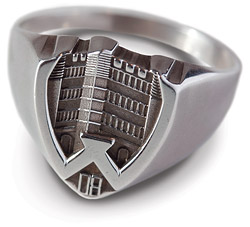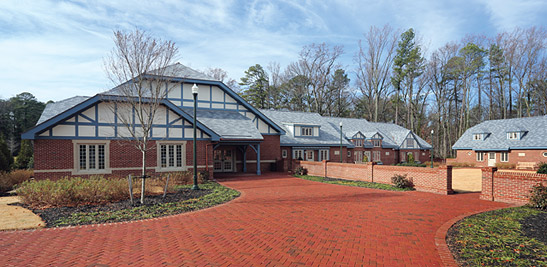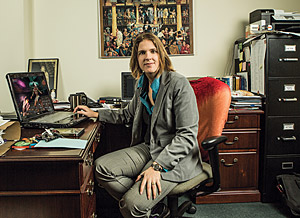
Ring Dance
Not so black and white
Claire Dormer, ’14, works her way through the rack of long, white dresses with a clear image in her mind of the one she is looking for. In a few months, arm in arm with her father, she will walk down the grand staircase of the Jefferson Hotel wearing “the perfect dress.”

“Finding the right dress for Ring Dance is difficult because in the brief moments I have in front of my friends and family on those stairs, I want to feel like my dress is representative of who I am and my personality,” Dormer said. “I want everyone to see what my school has done for me and why I am so proud to be a Westhampton woman.”
In 2015, the centennial anniversary of the event, Ring Dance will feature junior women, sans escorts, in black dresses.
The change from white to black attire, according to a letter from Westhampton Dean Juliette Landphair, resulted from concerns that white formal wear, frequently associated with weddings or debutante balls, is costly, impractical, and at odds with the event’s purpose of celebrating women’s academic accomplishments. The lack of escorts, Landphair explained, will further focus the celebration on each individual.
A story on The Collegian’s website about the change prompted a lot of debate, as some alumnae and students voiced displeasure at the changes, while others offered support.
“If you ask Westhampton alumnae from over the decades, you will find that Ring Dance has taken many forms,” Landphair said. “As the dean, my job is to ask how traditions make sense for today and tomorrow’s students. In looking at Ring Dance, we realized that there were students who felt excluded by aspects of the event. At its core, it is a celebration of academic achievement.”
—Anika Kempe, ’13
Elections
Elephants, donkeys, and Spiders
Richmond was front and center in the nation during the 2012 election season.
Hours after the vice presidential debate, MSNBC’s Hardball host Chris Matthews did live interviews with attendees at a watch party on campus. Less than two weeks before the election, NBC’s Lester Holt hosted the Sunday Today show live from an outdoor set in front of Jepson and Ryland halls as Hurricane Sandy rolled in. Both Today and that evening’s NBC Nightly News broadcasts featured an interview with political science professor Ernest McGowen.
For broader perspective, the University welcomed back to campus Marisa Hall Summers, an ordinary citizen who stumped President George H.W. Bush with a question about the national debt during the first-ever town hall-style debate in 1992 in the Robins Center. Summers, debate host Carol Simpson, and other panelists discussed the debate’s legacy during a campus forum. “The fact that the citizens finally had a voice in the debates is one of the more significant parts of the legacy,” said panelist Diana B. Carlin, co-author of The 1992 Presidential Debates in Focus.
In October, President Edward L. Ayers interviewed Virginia Senate candidates Govs. Tim Kaine and George Allen
on stage in the Modlin Center using questions submitted by Richmond
students. The event launched the new Sharp Viewpoint Speaker Series,
established in honor of Richard L. Sharp. Kaine, a senior distinguished lecturer in the leadership studies and law schools, won the Senate seat.
Guides
A smart buy
The University stepped onto the threshold of the nation’s top-10 best value private colleges, according to the latest rankings by Kiplinger’s Personal Finance. UR moved up to 11 on this year’s list and remains among the few colleges and universities offering need-blind admission—not considering an applicant’s ability to pay in the admission decision—and meeting 100 percent of financial need.
The Princeton Review again included UR in its annual guide to the best colleges and universities. The guide ranks Richmond fourth for “Best Career Services,” ninth for “Best Classroom Experience,” 14th for “Most Beautiful Campus,” and 17th for “Best Athletic Facilities.”
Spaces
Architectural excellence
The chalkboard sign advertising nutella gelato at Passport Café might be what caught students’ eyes as they walked through the Carole Weinstein International Center this fall, but it was the building itself that the Virginia Society of the American Institute of Architects noticed.
This fall, the society awarded the center its 2012 award for Design Excellence in Contextual Design. The jury called the center “an outstanding building, clear in its concept and exemplary in its detailing. … The central courtyard is handsomely executed and rich with reference. The building is at once iconic and contextual.”
“A place like no other on campus”
It took 10 pairs of giant scissors to cut the ceremonial ribbon marking the opening of the Student Activities Complex (below), a new $5 million student facility just west of North Court. Seven sorority cottages, plus one additional cottage and a 1,500-square-foot student center dubbed “The Web,” offer student organizations a common space “to sponsor events, be energized, or interact with others,” said Alison Bartel Keller, director of student activities.


Heard on Campus
“I thought that Bobby Kennedy was a new breed of politician. Sadly, he was the last of a breed, the last of the [politicians] who would get up and speak without notes and not consult their political consultants.”
—Joe Klein, TIME Magazine columnist and author, speaking as part of the Jepson Leadership Forum
• • •
“I thought, ‘Oh, look at that. Words come out of my mouth.’ And then it was alright, and then I quite enjoyed it.”
—Supreme Court Justice Elena Kagan, on answering her first question when she argued before the court as solicitor general in 2009
• • •
“If we don’t allow people to make a living, then people aren’t going to make the work. In the end, we’ll be poorer, not richer. ... People with talent will say, ‘Well, I’m going to go into pharmaceuticals because I can make my money there.’”
—Composer Philip Glass discussing copyright law with law students during the Philip Glass Festival
In the media
“The Arab Spring produced a complex matrix of political instability,” Mimi Hanaoka, assistant professor of religion, wrote in a Los Angeles Times editorial in the days following the killing of four Americans in Benghazi, Libya. “Using religion alone to explain what’s happening is counter-factual and counterproductive.”
The New York Times turned to law professor Andy Spalding to explain why a law prohibiting U.S. companies from bribing foreign officials was snaring German, French, Japanese, and other foreign-based companies. “They are based, in part, in the United States,” he said. “A culture of compliance may be slower to take in other countries, and many are not aware of the rapid escalation of [these] cases or its broad jurisdictional scope.”

The old aphorism that a thousand-mile journey begins with a single step is the logic behind the "Be One" campaign, a sustainability effort launched this fall. It encourages students to take one new, environmentally friendly step monthly over the year—shorter showers one month, more recycling the next. "When we all make individual changes over time, it adds up," says the campaign's website (sustainability.richmond.edu/one).
At the Smithsonian
“People are still talking about this,” President Edward L. Ayers told an audience of 200 students at the Smithsonian’s National Museum of American History, where he moderated a panel discussion about the Emancipation Proclamation as its 150th anniversary approached.
“It shows ... just how deeply entrenched slavery was in this nation and how hard it ... remains to expunge it politically, economically, and socially and spiritually. We’re still wrestling with it.”
Thought Process

From ancient Athens ...
A few years ago, seniors in the Robins School of Business gave professor Joe Hoyle two superlatives: “scariest professor” and the one who “cares the most.” In September, Bloomberg Businessweek added a third: one of the country’s “favorite professors” for relying on the Socratic method to teach, of all disciplines, accounting.
“When I told my students that I was never going to lecture again—that I was only going to ask questions—they looked at me like I was from Mars,” the article quoted him saying. “The questions are as weird as I can make them. The idea is that I’m forcing them to think about things in a different way.”

... to pixelated dystopias
Leadership professor Kristin Bezio has heard it all before: Video games encourage violence and sex, make people stupid. Contemporaries said the same things about Shakespeare’s work, she said, “and now it’s considered one of our highest forms of art, which Shakespeare would’ve thought was deeply funny.”
The syllabus for her course on dystopia, revolution, and leadership lists the video game Bioshock alongside George Orwell and The Hunger Games as a required text. “As we study our culture and our ideas of who we are, where we want to go, and what we want to become,” she said, “it’s our popular culture that really shows that.”
Local
What he’s having
In a small corner of the industrial-scale kitchen of Heilman Dining Center, pastry chef Joshua Carroll carefully assembles a handful of ginger and Asian pear upside down cakes and buttermilk pies.
He’s not making them for the students who crowd D-hall three times a day. The treats are headed downtown, to Richmond on Broad Café.
The café is part of UR Downtown, located at the corner of Seventh and Broad streets, a stone’s throw from the capitol. The facility, which opened in 2009, has become a central hub for experiential student learning and collaboration with nonprofit, government, and legal partners.
And now, after a September ribbon-cutting, it’s the place to get Carroll’s pastries, plus fresh salads, soups, and sandwiches, says chef Matt Lee. An emphasis on locally-sourced, fresh foods means the menu changes often.
“That’s one of the aspects I really enjoy about my job,” he said, “being able to create menus based on what’s fresh, what’s local, and what’s seasonal.”
Four reasons to source locally
When the café opened, chef Matt Lee estimated that 25 to 35 percent of the menu was locally sourced, a figure he’s working to get as high as 75 percent. Here’s why he says local sourcing makes sense for his customers and all of us:
1. Flavor Produce not locally sourced is often “picked early and ripened on the truck, so they don’t have the benefit of the sunlight and the rain to really develop the flavor.”
2. Community “I think it’s really important to source from local farmers to support them.”
3. Cost “A lot of times, it’s less expensive because you don’t have to pay the travel time,” though farms will sometimes charge more for specialty products, he says.
4. Sustainability “The less time it has to travel, the less impact it has on the environment.”
Treasures
Poor Richard in Boatwright
Tucked away in a basement room all but invisible to the undergraduates studying nearby, Lynda Kachurek surveys the books and boxes stacked tidily around her. After years of safekeeping but only intermittent processing, the contents of this room in Boatwright Memorial Library have been known to only a few.
Kachurek, the new head of rare books and special collections, is charged with making its treasures more widely accessible. On this day, she’d returned with a visitor for something that had caught her eye, a folder labeled “Ben Franklin.” That description had left her too nervous to open it when she first saw it.
There are entire shelves of archival boxes that Kachurek has yet to open, their contents known, in some cases, only to whomever last closed them. From a blue box, she retrieved the Franklin folder. Inside, a clear green plastic sleeve held a letter that described in flourishing penmanship the business of an unnamed society. The letter, dated 1744, was signed “B. Franklin.”
“You must be like a kid in a candy store,” her visitor offered.
“Oh, I am,” she smiled.
Next is figuring out whether it’s an original. She has her doubts—and thousands more files to explore.


